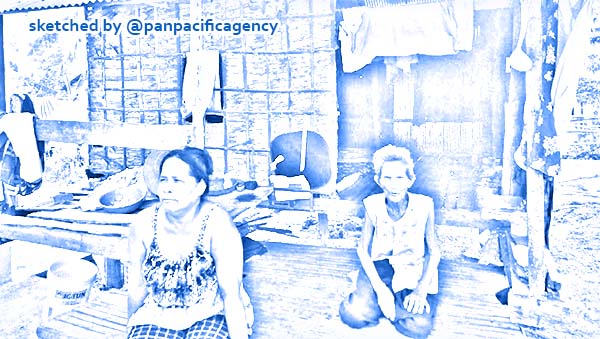Coronavirus deepens Cambodia’s loan crisis

Pich Poy, a mother of five children was sitting on a wooden bed with her old mother in Cambodia. KT/ Sorn Sarath. Sketched by the Pan Pacific Agency.
PHNOM PENH, Nov 16, 2020, AFP. Trapped under a mountain of crippling debt, Cambodian farmer Roeurn Reth fears she will have to sell her land to repay microfinance loans that have ballooned due to pandemic-spurred job losses in her family, The ASEAN Post reported.
What started as a US$3,000 sum from a loan shark for her son’s wedding has now grown to about US$7,000, she says – the result of additional financial needs that have cropped up.
Her sons – who crossed illegally into neighbouring Thailand – previously sent money home to help with repayments, but they are now out of work.
“Because of COVID, we could not find jobs… and my sons do not have money,” she said tearfully, outside her modest home in northern Siem Reap province.
“Now, I cannot clear my debts.”
Roeurn Reth, 50, is among more than 2.6 million Cambodians who have turned to microfinance because of limited access to traditional banking.
But in poor countries with little regulatory oversight, the practice has come under fire for predatory tactics including targeting rural villages where residents have limited financial acumen.
In Cambodia where the average yearly income is a meagre US$1,700, borrowers in 2019 racked up a total debt of US$10 billion to microfinance lenders.
This puts the kingdom at an average loan of US$3,804 per person – the highest amount in the world, according to local rights group Licadho.
A lack of enforcement also has illegal lenders offering “throat-slittingly high” interest rates of up to 30 percent over a year, says Licadho’s Am Sam Ath.
The informal lending industry has long been a complicated issue for the kingdom, he explains, with Cambodians turning to licensed microfinance institutions to repay private lenders only to find themselves trapped in a cycle of debt to more lenders.
“With the COVID pandemic and floods in the rural areas, people face double the trouble, with more difficulties over debts,” he says.
While Cambodia itself has recorded only around 300 cases, the pandemic has seen tens of thousands of migrant workers return from Thailand as jobs have dried up, putting families living paycheque-to-paycheque under strain.
In desperation, Roeurn Reth and her husband travelled from their sleepy village of Trapeang Veng to the capital Phnom Penh to look for jobs at construction sites, only to be rejected because of their age.
She worries the next time the debtors come they will bully her to sell her house and rice fields which they hold as collateral.
“I am so worried every day, I swallow rice bitterly,” she says.
‘Easy Cash’
Surrounded by lush rice fields, the remote Trapeang Veng is only accessible by bumpy roads, 50 kilometres (30 miles) from the tourist hotspot of Angkor Wat.
Faded posters advertising “easy cash” are tacked up on coconut trees across the village, touting loans as a simple path to fulfilling aspirations from motorbikes and tractors to dream homes.
But many houses have been abandoned by owners who have fled to avoid debt collectors.
These houses are difficult to miss, says village chief Dorm Deam, pointing at a concrete home with ornate wooden carvings on the padlocked front door.
“Since the coronavirus pandemic, the situation has gotten worse,” he said.
“They are strangled by debts.”
Today, more than three-quarters of Trapeang Veng’s 113 families owe a total sum of some US$300,000.
Human rights groups have called for the government to put a freeze on repayments and demanded lenders return more than one million land titles held as collateral.
Some 270,000 Cambodians have had their loans restructured in recent months to cope with the economic fallout of the virus, National Bank of Cambodia director Chea Serey says.
Children Abroad
With so many working-age Cambodians migrating to neighbouring Thailand for work – up to two million according to rights groups – the remaining residents in Trapeang Veng are mostly the elderly and children.
Villager Penh Tay says her daughter and two sons had crossed the border, but lost their jobs after the virus outbreak.
“I hoped my children in Thailand could help, but now they don’t have jobs,” the 53-year-old said as she combs her granddaughter’s hair.
With a combined debt of US$20,000 to a microfinance group and two informal lenders, Penh Tay says she cries herself to sleep at night.
One lender seized her cow last month after she missed a repayment deadline.
“I’m scared of losing my house and having no place to live,” she says, adding that her neighbour was forced to sell.
“I don’t know what they will take from me next.”